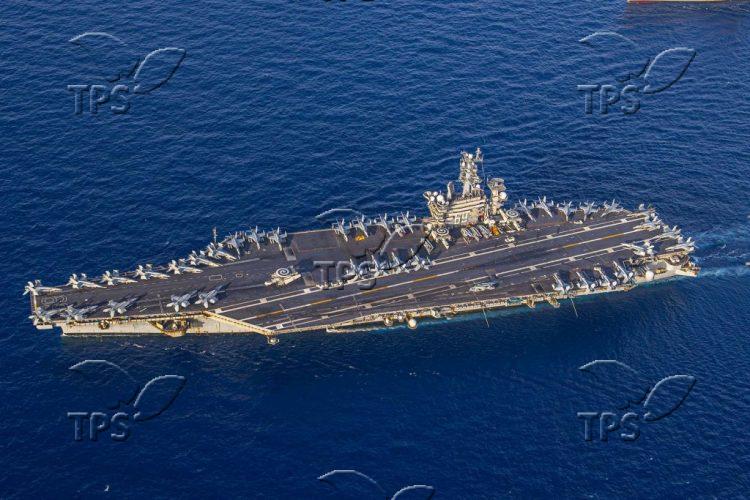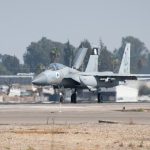Israel’s UN Envoy Links Iran to Houthi Attacks in Red Sea
Jerusalem, 4 January, 2024 (TPS-IL) -- Imploring the United Nations Security Council to address the “radioactive Shi’ite elephant in the room,” Israel’s U.N. ambassador on Wednesday linked Iran to the conflicts throughout the region.
“The ayatollah regime is the one thing that ties together all the elements of destruction in the Middle East,” said Gilad Erdan during an emergency session on the growing Houthi threat in the Red Sea and Gulf of Aden. “It funds, arms, trains and directs the Houthis, Hamas, Hezbollah in Lebanon, other terror groups in Syria and Iraq, and Palestinian Islamic Jihad. Iran has spent decades spreading cancerous jihadism across the region.”
Eight of the 15 Security Council members called for Wednesday afternoon’s briefing and closed consultations to address Yemen’s Houthi rebels and their increasing attacks on commercial vessels, which they seek to prevent from reaching Israel in retaliation for Israel’s war against Hamas, a fellow Iranian proxy.
The Houthis vowed in early December to target any Israel-bound ship in the Red Sea, regardless of its ownership.
The hijackings and strikes by the Houthis—officially known as Ansar Allah—have severely disrupted international shipping, forcing many vessels to instead traverse Africa’s Cape of Good Hope, adding weeks of travel and significant costs.
On Nov. 19, the Houthis captured the MV Galaxy Leader, a Japanese-operated cargo ship with links to an Israeli businessman, and its 25 crew members. The vessel and its crew are being held hostage in the Yemeni port city of Hodeidah.
U.S. naval vessels thwarted multiple attempted seizures and drone attacks in the weeks following.
On Dec. 18, Washington announced the establishment of a multinational task force, called “Operation Prosperity Guardian,” to deter and counter the Houthi attacks. Countries openly participating include Bahrain, Canada, France, Italy, the Netherlands, Norway, the Seychelles, Spain, the United Kingdom and the United States. The Red Sea initiative includes the USS Dwight Eisenhower aircraft carrier strike force.
However, attacks have continued, and on Dec. 31, U.S. Navy helicopters sank three ‘Iranian-backed Houthi small boats’ which had come dangerously close to a container ship. The same ship had been struck with a missile the day before.
Chris Lu, U.S. ambassador to the United Nations for management and reform, said in Wednesday’s meeting that while Washington did not seek confrontation with Tehran, the Islamic Republic needed to make a choice with respect to its patronage of the Houthis.
“[Iran] can continue its current course or it can withhold its support, without which the Houthis would struggle to effectively track and strike commercial vessels navigating shipping lanes through the Red Sea and Gulf of Aden,” said Lu.
Iranian Warship in Red Sea
Iran state news reported on Monday that an Iranian warship had crossed the Bab el Mandeb Strait and entered the Red Sea. Earlier reports suggested that an Iranian surveillance vessel in the Red Sea was passing on information to the Houthis for use in their attacks.
On Wednesday, the United Kingdom warned the Houthis over its indiscriminate attacks, with Deputy Permanent Representative James Kariuki stating that London “will not hesitate to take action to deter threats to freedom of navigation in the Red Sea.”
Algeria, which joined the Security Council this month as the de-facto Arab world representative, used its inaugural address to call on coastal Red Sea states to take the lead in pressing for a solution.
Algeria’s ambassador, Amar Bendjama was among those who expressed concern about the impact of the Houthis’ actions on a fragile ceasefire between the Houthis and Saudi Arabia. The ceasefire has largely held for a year, but talks are still ongoing toward a more durable and lasting halting of hostilities in a war that had devastating humanitarian consequences for Yemen.
While Russia was critical of the Houthis’ actions, Vassily Nebenzia, Moscow’s U.N. envoy, told the Security Council that the rebels’ violence was not taking place “in a vacuum,” echoing language used by U.N. Secretary-General Antonio Guterres in trying to contextualize Hamas’s Oct. 7 massacre within the broader Israeli-Palestinian conflict, setting off a firestorm of criticism from Jerusalem.
“What is happening in the Red Sea is a direct projection of the violence in Gaza, where Israel’s brutal operation has been ongoing for three months,” said Nebenzia.
Accusing the United States of “covering up Israel’s actions” and preventing the Security Council from forcing a ceasefire on Israel, Nebenzia alleged that “this causes anger in the Arab world, sometimes taking such dangerous forms as the actions of Ansar Allah in the Red Sea.”
Japanese Ambassador Yamazaki Kazuyuki called the Houthis’ actions “reckless,” demanding the release of the Galaxy Leader crew.
The Security Council has held prior discussions on the Houthis’ Red Sea attacks, during its regular meeting on Yemen and in other formats. The council released a statement on Dec. 1 condemning the aggression, but there was no immediate action taken following Wednesday’s session.
Earlier on Wednesday, a joint statement was released by Australia, Bahrain, Belgium, Canada, Denmark, Germany, Italy, Japan, the Netherlands, New Zealand, the United Kingdom and the United States.
“Ongoing Houthi attacks in the Red Sea are illegal, unacceptable, and profoundly destabilizing,” the statement read, noting the significant global trade, including grain, oil and natural gas, that flows through the Red Sea,” the statement read.
“There is no lawful justification for intentionally targeting civilian shipping and naval vessels,” the statement said. “The Houthis will bear the responsibility of the consequences should they continue to threaten lives, the global economy, and free flow of commerce in the region’s critical waterways.”







